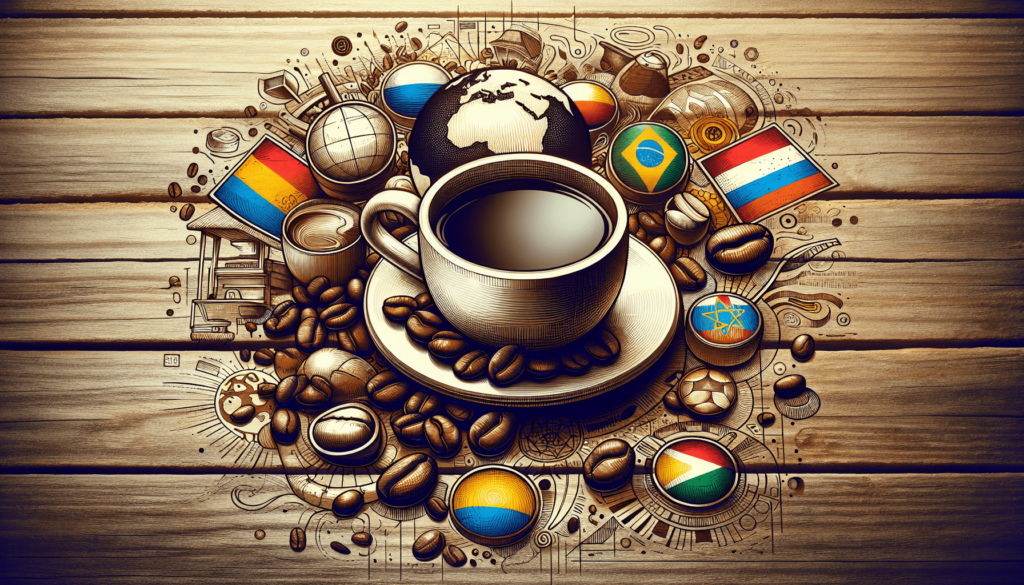What country makes the best coffee? It’s a question that many coffee enthusiasts ponder, especially when they savor a cup and wonder about its origins. Coffee is a beloved beverage worldwide, and its quality can vary greatly depending on where it’s grown and how it’s processed. Let’s embark on a journey through some of the most famous coffee-producing countries and see what makes each one unique.
The Origins of Coffee
Where Did Coffee Originate?
Coffee’s roots trace back to Ethiopia, where it’s believed that the coffee plant, Coffea arabica, was discovered in the 9th century. Legend has it that a goat herder named Kaldi noticed his goats became particularly energetic after eating the berries from a certain tree. Intrigued, Kaldi tried the berries himself and felt a similar boost in energy.
This discovery eventually reached the Arabian Peninsula, where coffee cultivation and trade began. By the 15th century, coffee was being grown in the Yemeni district of Arabia and began spreading across the Middle East, Persia, Turkey, and into Africa.
Coffee’s Spread Across the Globe
Coffee quickly became a global commodity. With its growing popularity, the cultivation of coffee plants extended to tropical regions around the world. Today, numerous countries have built their economies and cultures around coffee, developing unique practices and traditions that lead us to ask again, “What country makes the best coffee?”
Evaluating Coffee Quality
Factors Influencing Coffee Quality
Before delving into specific countries, it’s essential to understand what determines the quality of coffee. The factors influencing coffee quality are:
- Climate and Soil: The coffee plant thrives in tropical climates with rich soils and appropriate altitudes. The combination of these factors contributes to the beans’ flavor and aroma.
- Processing Methods: How coffee beans are harvested and processed significantly affects the final taste. Methods include wet processing, dry processing, and honey processing, each imparting different flavor notes.
- Bean Varietals: The type of coffee bean, such as Arabica or Robusta, plays a crucial role. Arabica beans are generally considered higher quality and have a more refined flavor profile.
- Roasting: The art of roasting can make or break the coffee’s flavor. Different roasting techniques can bring out various characteristics of the beans.
- Brewing Methods: Finally, the way coffee is brewed can affect its taste. This involves the grind size, water temperature, brewing time, and equipment used.

Renowned Coffee-Producing Countries
Now, let’s explore some of the top coffee-producing countries and what sets their coffee apart.
Ethiopia
Ethiopia, the birthplace of coffee, has a long history of coffee cultivation and is renowned for its distinct and flavorful beans.
Unique Characteristics
Ethiopian coffee often possesses a complex flavor profile with bright acidity and fruity or floral notes. Yirgacheffe, Sidamo, and Harrar are prominent regions known for their high-quality beans.
Cultural Significance
Coffee holds immense cultural importance in Ethiopia. The traditional coffee ceremony is a testament to its central role in Ethiopian social life. Often lasting several hours, this ceremony involves roasting beans using an open flame, brewing, and serving in a specific manner.
Colombia
Colombian coffee is celebrated globally for its consistently high quality and smooth, balanced flavor.
Ideal Growing Conditions
Colombia’s diverse geography, with its mountainous regions and optimal climate, provides perfect growing conditions for coffee. Different regions, such as Medellín, Manizales, and Bogotá, produce beans with varying taste profiles, but all are known for their mild and well-balanced flavors.
Marketing and Reputation
The country has made significant efforts to market its coffee, creating a strong brand around “Café de Colombia.” This branding ensures that Colombian coffee is synonymous with quality and reliability.
Brazil
Brazil is the largest coffee producer in the world, contributing to one-third of the global coffee supply.
Production Scale
The vast size of Brazil’s coffee plantations allows for a diverse range of coffee beans. From the strong and nutty flavors of Minas Gerais to the sweeter beans of Bahia, there’s a Brazilian coffee to suit almost every palate.
Coffee Culture
Brazilian coffee is intertwined with the country’s culture and economy. The traditional cafezinho, a small, strong, and sweet coffee, is a daily ritual for many Brazilians.
Guatemala
Guatemala’s rich volcanic soil and microclimates are ideal for growing coffee with a unique taste.
Flavor Profile
Guatemalan coffee is known for its full body and rich flavor with a hint of chocolate and a robust aroma. Regions like Antigua, Atitlan, and Huehuetenango produce some of the finest beans.
Coffee Tourism
Coffee farms in Guatemala often welcome tourists for tours, allowing visitors to experience the entire coffee-making process—from planting to brewing—firsthand. This tourism helps promote Guatemalan coffee globally.
Costa Rica
Costa Rica takes its coffee very seriously, enforcing laws that only allow Arabica beans to be grown.
Quality Measures
The country’s strict coffee regulations ensure that only high-quality beans are cultivated. Costa Rican coffee is often characterized by bright acidity, medium body, and sweet, fruity flavors.
Sustainable Practices
Costa Rica is also a leader in sustainable coffee farming practices. Many farms are Rainforest Alliance Certified, ensuring environmentally friendly and ethical farming methods.
Jamaica
Jamaica’s Blue Mountain coffee is one of the most sought-after and expensive coffees in the world.
Exclusive and Limited
The Blue Mountains’ unique climate, with its misty and cool weather, along with nutrient-rich soil, produces beans with an exceptional mild flavor and lack of bitterness. This exclusivity makes it a luxury item among coffee connoisseurs.
High Standards
Blue Mountain coffee must meet stringent quality standards set by the Coffee Industry Board of Jamaica to be certified as genuine Blue Mountain coffee.
Emerging Coffee Producers
While traditional coffee-producing countries have set the benchmark for quality, several emerging nations are gaining recognition for their coffee.
Vietnam
Vietnam is the largest producer of Robusta beans, which are more robust and have higher caffeine content compared to Arabica beans.
Growing Popularity
Although traditionally known for its production of Robusta beans, Vietnam’s coffee industry is evolving, with more farmers experimenting with high-quality Arabica beans. Vietnamese coffee, often served with sweetened condensed milk, offers a unique and rich flavor profile.
Economic Impact
Coffee is a significant export for Vietnam, contributing massively to the country’s economy and providing livelihoods for millions of farmers.
Kenya
Kenyan coffee is known for its bright acidity, full body, and winy flavor with fruity undertones.
Unique Growing Conditions
The country’s high altitude, volcanic soil, and equatorial climate create perfect conditions for coffee cultivation. Regions like Nyeri and Kirinyaga are celebrated for producing top-tier beans.
Auction System
Kenya’s coffee quality is maintained through an auction system, ensuring transparency and fair pricing for farmers while also guaranteeing high standards for buyers.
Peru
Peruvian coffee has been gaining traction for its organic and fair-trade certifications.
Diverse Microclimates
The varied geography of Peru allows for a wide range of coffee flavors, from fruity and floral to chocolatey and nutty. Areas like Chanchamayo and the northern region of Cajamarca are particularly renowned.
Sustainable Practices
Many Peruvian coffee farms emphasize sustainable practices, with a focus on organic farming and fair trade, making their coffee both ethical and environmentally friendly.
Rwanda
Rwanda’s coffee industry, though relatively young, has quickly established a reputation for high-quality beans.
Social Significance
Coffee is more than just an economic commodity in Rwanda; it’s a source of national pride and a means of rebuilding the country post-genocide. The government has invested heavily in improving coffee quality and supporting farmers.
Flavor Profile
Rwandan coffee typically features bright acidity, medium body, and profiles that can range from fruity to floral, making it a favorite among specialty coffee enthusiasts.

The Art of Tasting Coffee
Understanding Coffee Cupping
Tasting coffee, also known as cupping, is a precise process used to evaluate the qualities of a coffee bean. The cupping process involves smelling the ground coffee, brewing it, breaking the crust (the layer of coffee grounds that forms on the surface), and tasting the brew.
Flavor Profiles and Notes
When cupping coffee, tasters describe the flavor profile using specific notes. Common flavor notes include:
- Fruity: Tastes reminiscent of fruits like berries, citrus, or tropical fruits.
- Floral: Scents and flavors similar to flowers like jasmine or rose.
- Nutty: Hints of nuts like almond, hazelnut, or walnut.
- Chocolatey: Cocoa or chocolate-like flavors.
- Spicy: Notes similar to spices such as cinnamon or clove.
The Importance of Aroma
A significant part of coffee tasting is the aroma. The smell of freshly ground coffee can indicate its flavor potential. Aromas can range from sweet and fruity to earthy and spicy, each contributing to the overall tasting experience.
Choosing the Best Coffee for You
Personal Preferences
Ultimately, the best coffee is subjective and depends on personal preference. Some may prefer the bright acidity of Ethiopian coffee, while others might enjoy the balanced smoothness of Colombian beans.
Experiment and Explore
Don’t hesitate to try coffees from various countries to discover what suits your palate best. Specialty coffee shops and online retailers often offer sampler packs that include beans from multiple origins.
Consider Sustainability
When choosing coffee, consider supporting brands that emphasize sustainability and fair trade. These options often ensure that farmers are compensated fairly and that environmentally friendly practices are used.
Conclusion
So, what country makes the best coffee? The answer is multifaceted and depends on various factors, including personal taste preferences, growing conditions, and processing methods. Countries like Ethiopia, Colombia, Brazil, and Jamaica have long histories of coffee cultivation and are renowned for their high-quality beans. Emerging coffee nations like Vietnam, Kenya, Peru, and Rwanda are also making significant strides in producing exceptional coffees.
By understanding the nuances of coffee production and exploring different origins, you can appreciate the diverse world of coffee and find the perfect cup that resonates with your taste buds. Enjoy the journey of discovering the best coffee, one cup at a time.
